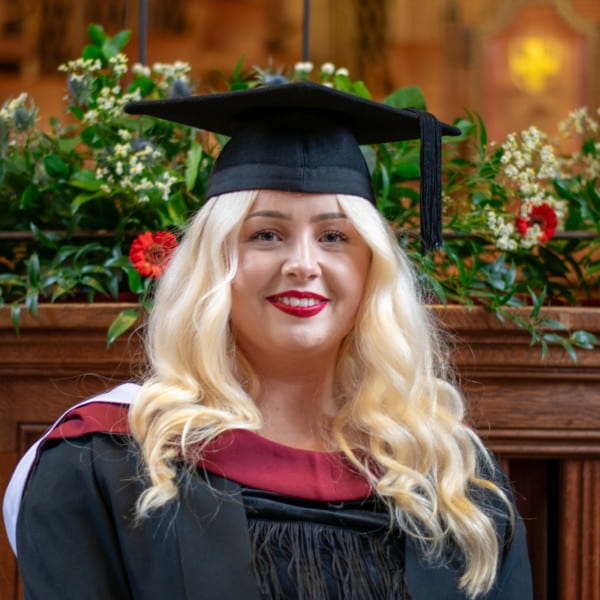Alice explains how her master’s degree training empowered her to achieve a long-held ambition of using her expertise in a meaningful career.
Why I chose to study MSc Social Work
I have always had a passion for social justice. Whilst studying for an undergraduate degree in Law, I found myself steering towards units such as immigration and family law which spoke to my interests.
During my final year I also began working in a children’s home, initially to fund my degree but also to explore more meaningful employment. It was during this time that I met my husband-to-be and his family, who were involved in social work and encouraged me to pursue the field.

Alice
Growing up in the Southwest area, I knew of the University of Bristol’s reputation for world class education and when I looked at the entry requirements, I knew I stood a good chance of being accepted.
There are various pathways into becoming a social worker, and you don’t need to have a master’s degree, but it enhances your C.V. and I believe, as a practitioner, denotes a greater depth of experience and expertise. This, in turn, sets you up for future leadership positions.
The key benefits of this programme
The MSc in Social Work at Bristol is a two-year programme and you get a lot of support from the University. In the first year you are on campus every day, allowing you to build strong relationships with your cohort.
This sets the programme apart from shorter social work courses where alongside your studies you might already be ‘in practice’ and managing real caseloads without the time to unpack what you have learnt. By contrast, this qualification allows you more time to digest the taught components and your student identity is vigorously protected. This gave me an opportunity to discuss different theories and scenarios within a ‘safe’ classroom environment.
When I started practicing as a Social Worker, I had to hit the ground running and I held a lot of responsibility early on. For this reason, I think it important to have a solid foundation. There will be challenges from families and professionals alike and you need a certain level of resilience.
Having the time on the programme to reflect on these challenges via the placement learning groups meant I was well prepared. We did a lot of work on being ‘professionally boundaried,’ knowing when to push back and when to ask for support.
Research in practice
What I loved about the programme was the opportunity to discover and understand a broad spectrum of social work research. The Bristol qualification provides a strong knowledge base in three areas: Adults, Mental Health, and Children.
The longer dissertation (15,000 words) was a personal challenge but one I am so proud of completing. My research was in the ‘Criminal exploitation of teenage boys and how Social Workers can respond.’ I chose this as it’s an under-researched area and a huge concern both locally in Bristol and in the UK and came about because of my own experiences of working with young people in care.
My dissertation has contributed a lot to my understanding in practice. I am now managing cases of teenage boys with those kinds of concerns. It has really underpinned how and what I do; implementing the lessons I have learnt from my research.
Of course, it can’t fully equip you, but I imagine if I hadn’t had the opportunity to learn about some of these issues in greater detail and I had been given a case concerning this, I might have felt overwhelmed.
Access to disability support
During my first year of the programme, my tutors identified that I had Dyslexia. This helped me understand why I do things the way I do. As a result, the university provided a mentor who I met with on a weekly basis so that I could talk to them when I was struggling. I found them to be incredibly supportive.
I think this goes to show that even if you don’t think you are so academically inclined with essays etc., the support is there to help you through it.
Access to experienced practitioners
The teaching style on the programme was varied. We often had guest practitioners come to speak to us, which we really enjoyed. As the speakers were working in the profession, they were able to communicate learnings applicable to real life situations. These lectures allowed me the space to ask questions that I wouldn’t have done in practice.
I really enjoyed getting to know the cohort who had a range of different experiences – I had a background of children in care, a lot of people had already worked in mental health, crisis teams, or alongside adults with learning difficulties, other people had come from homeless services. This opened all our eyes to why we had come to social work in the first place. Through this experience, I have made friends for life, and I even now continue to see some of them in Practice.
My advice for people thinking about applying
This is a challenging course, but you won’t regret it! Don’t be put off by the length – The two years fly by and unlike some postgraduate courses, there is a summer break in between the first and second year, so you have a chance to rest and plan for your return.
I had a job lined up even before I ended my placement and so was able to start as soon as I had finished my studies, joining as a trainee in the child protection team for the local council. Once my dissertation results were in, I was then employed as a qualified social worker, and I couldn’t be more pleased with my decision to study for a postgraduate degree!

